Walking up to the pharmacy counter with a new prescription in hand feels like a small victory-until you realize you have no idea what you’re actually taking. You know the name, maybe the color, but not why it’s in your bag or what could go wrong. That’s where the real work begins. Medication safety isn’t just about picking up your pills. It’s about asking the right questions before you leave the store.
What is this medication for?
This is the most basic, yet most often skipped question. You might assume your doctor already explained it, or that the label says enough. But labels are written in medical jargon. A pill labeled "Hydrochlorothiazide" doesn’t tell you it’s a water pill for high blood pressure. Ask: "What condition is this meant to treat?" If the pharmacist says "for fluid retention," follow up: "So it helps me pee more, right?" Simple language sticks. Knowing why you’re taking a drug helps you notice if it’s working-or if something’s wrong. One patient in Durban told me they stopped taking their cholesterol pill because they didn’t think it was doing anything. Turns out, it was working so well their levels dropped below normal. They didn’t know that was possible until they asked.How and when should I take this?
Timing matters more than you think. Some meds need to be taken on an empty stomach. Others must be swallowed with food to avoid nausea. Some are best in the morning. Others at night. Take a blood pressure pill at night when you should’ve taken it in the morning? Your pressure might spike during the day. Take an antibiotic with dairy? It won’t absorb properly. Ask: "Should I take this before, with, or after meals?" And don’t forget to ask about timing: "Do I take it once a day or four times?" One woman in Cape Town started taking her thyroid pill at night because she forgot in the morning. Her doctor never told her it interferes with sleep. She felt tired all day-not because of her thyroid, but because of when she took the pill.What side effects should I expect?
All meds have side effects. Some are mild, like a dry mouth or drowsiness. Others are dangerous. Ask: "Which side effects are normal, and which mean I need to call a doctor?" Don’t just accept "some people feel dizzy." Ask for specifics. Is dizziness okay if it fades after two days? Or should you lie down and call 911? The CDC reports over 100,000 emergency room visits every year in the U.S. from unexpected side effects-many of which could’ve been avoided with better info. One man in Johannesburg started taking a new painkiller and noticed his skin turning yellow. He thought it was jaundice. It wasn’t. But he would’ve ignored it if he hadn’t asked. The pharmacist told him it was a rare but known reaction to the drug, and he stopped it before his liver got damaged.Does this interact with anything else I’m taking?
This is the big one. People think only prescription drugs matter. They forget about vitamins, herbal teas, painkillers from the shelf, even grapefruit juice. Ibuprofen with blood thinners? Risk of internal bleeding goes up by 40-60%. St. John’s Wort with antidepressants? Could trigger serotonin syndrome-a life-threatening condition. The American Pharmacists Association says 89% of pharmacists catch dangerous interactions during consultations. But only if you tell them everything. Bring your whole bag: supplements, eye drops, skin creams, even cough syrup. One patient brought a bottle of turmeric capsules. The pharmacist spotted a conflict with her blood thinner. She’d been taking it for "joint pain" and never thought it counted as a drug. It does.Is there anything in this that could cause an allergic reaction?
Allergies aren’t just about peanuts or shellfish. Medications contain fillers, dyes, and preservatives that can trigger reactions. Red dye #40, lactose, sulfites-these aren’t always listed on the box. Ask: "Does this contain any ingredients I should avoid if I’m allergic to X?" If you’re allergic to penicillin, ask if the new antibiotic is in the same family. If you’re lactose intolerant, ask if the tablet uses lactose as a binder. Pocono Pharmacy’s data shows medication allergies cause over 100,000 ER visits yearly. Most of those are preventable. A 72-year-old woman in Pretoria had a severe rash after starting a new diabetes pill. She didn’t know the tablet contained a dye she’d reacted to years ago. The pharmacist asked-and then switched her to a dye-free version.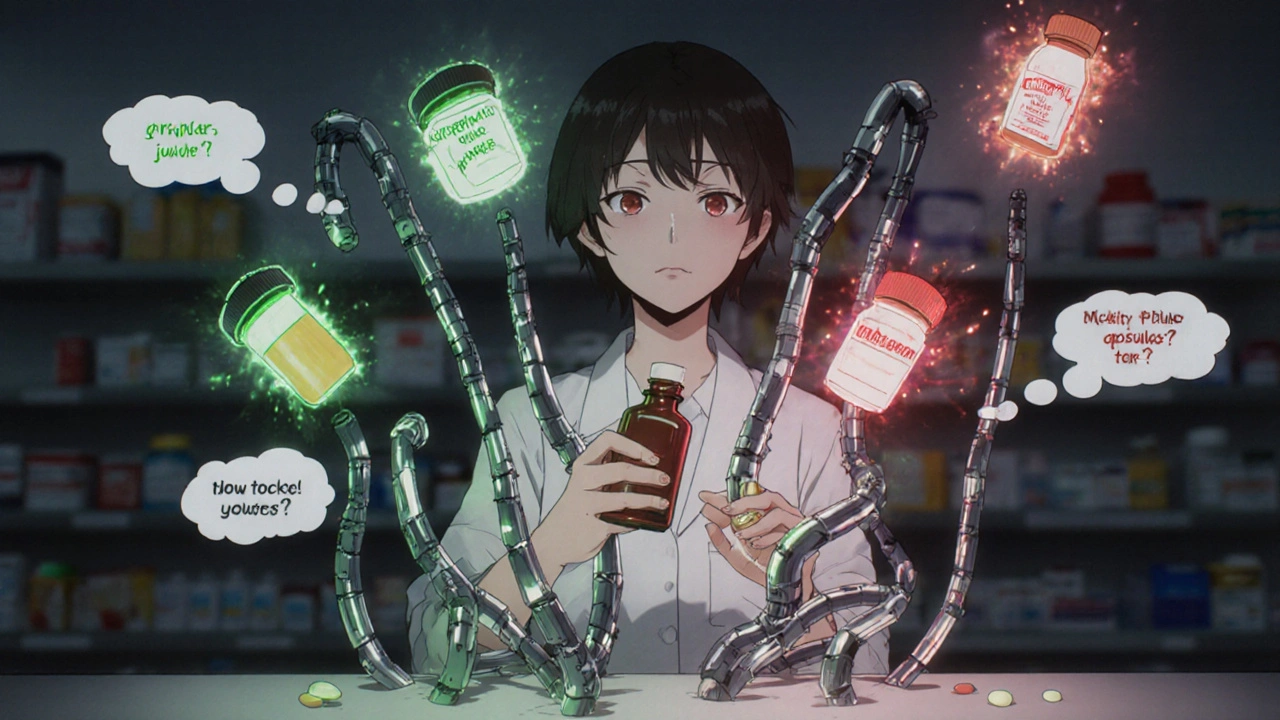
How should I store this?
Heat, light, and moisture can turn medicine into junk. Insulin goes bad if left in a hot car. Antibiotics lose strength if stored in the bathroom. Some pills need refrigeration. Others must stay dry. Ask: "Does this need to be kept cool? Can I leave it in my purse?" One pharmacist in Durban told me about a man who kept his insulin in the glove compartment during summer. The vial was ruined. His blood sugar spiked. He thought he was taking it wrong-not that the medicine had spoiled. The WHO and ISMP both stress storage as a key safety step. Even the FDA now requires patient guides to include storage instructions. Don’t assume. Ask.Can I repeat back what you just said?
This might feel awkward, but it works. A 2020 study in the Journal of the American Pharmacists Association found that when patients repeated instructions back, communication errors dropped by 31%. Say: "Just to make sure I got this right-you said take one pill every 12 hours, with food, and avoid grapefruit. And if I get dizzy or see spots in my vision, I call you immediately?" If the pharmacist corrects you, you just avoided a mistake. Pharmacies in Pennsylvania started using this "teach-back" method and saw a 44% drop in readmissions. You’re not being difficult. You’re being smart.What if I miss a dose?
Life happens. You oversleep. You’re traveling. You forget. Don’t guess. Ask: "If I miss a dose, what should I do?" Some meds say take it as soon as you remember. Others say skip it. Take two at once? That could be dangerous. One man took double his blood thinner dose because he thought he’d missed the morning one. He ended up in the hospital with internal bleeding. The rule isn’t the same for every drug. Always ask.Can I crush or split this pill?
Some pills are designed to release slowly. Crushing them can cause a dangerous rush of medicine into your system. Others are coated to protect your stomach. Splitting might make the dose uneven. Ask: "Is it safe to split or crush this?" If you have trouble swallowing pills, ask if there’s a liquid form. Don’t assume. A grandmother in Port Elizabeth crushed her high-blood-pressure tablet because her grandchild couldn’t swallow it. The tablet was extended-release. She ended up with dangerously low blood pressure.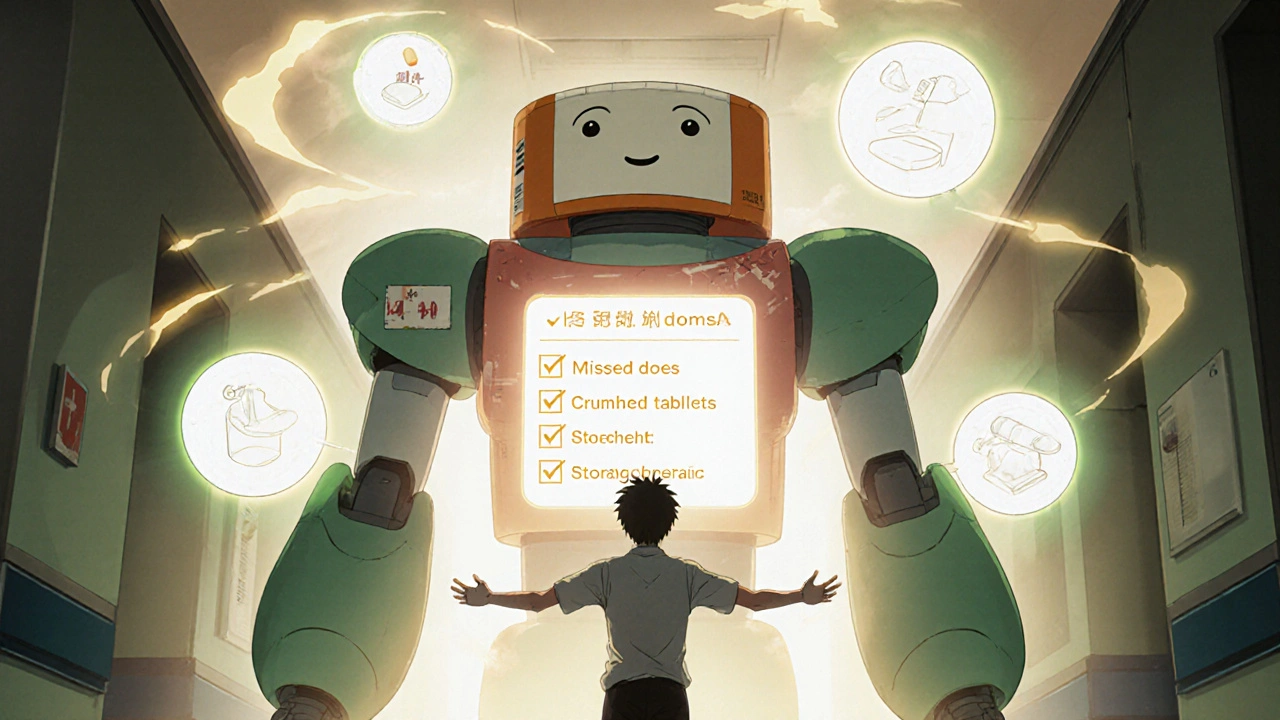
When should I come back or call if something’s wrong?
Medication safety doesn’t end at the counter. Ask: "When should I follow up?" Some drugs need blood tests. Others need monitoring after a week. If you feel worse, not better, when should you act? Get a clear red flag: "If I get X symptom, call immediately. If I get Y, wait and call tomorrow." This turns vague worry into clear action. One patient waited three days to call about swelling in her legs-thinking it was just heat. It was a reaction to her new heart medication. She was lucky. Others aren’t.What if I want to stop taking this?
Never quit cold turkey. Some meds cause withdrawal. Others make your condition bounce back worse than before. Ask: "Is it safe to stop this? Do I need to taper off?" Stopping antidepressants suddenly can cause brain zaps, dizziness, and panic. Stopping steroids can crash your immune system. Even over-the-counter sleep aids can cause rebound insomnia. The pharmacist can help you plan a safe exit-before you even think about quitting.Bring your whole medicine bag
Don’t just bring your new prescription. Bring everything you take. Pills, patches, creams, gummies, herbal teas, eye drops-even the ones you only use once a month. A 2022 Johns Hopkins study found that bringing all your meds to the pharmacy reduces polypharmacy risks by 29%. Pharmacists can spot duplicates, overlaps, and hidden dangers. One woman brought her 17 bottles. The pharmacist found three different meds for the same thing-and two that canceled each other out. She didn’t know any of it.Know what your pills look like
Pharmacies make mistakes. Sometimes you get the wrong pill. Sometimes the label is wrong. Always check: "Does this match what I got last time?" If the shape, color, or imprint is different, ask. ISMP says 18% of dispensing errors happen because patients didn’t notice the change. A man in Bloemfontein picked up his cholesterol pill and thought it looked wrong. He asked. Turns out, the pharmacy switched brands. The new one was cheaper, but the dose was half. He almost took two pills thinking they were the same. He didn’t. He asked.Ask for a printed list
At the end of your visit, ask: "Can you give me a printed list of everything I’m taking-with names, doses, and why?" Keep it in your wallet. Show it to every doctor. Use it when you travel. Most pharmacies will print it for free. If they don’t, ask for the name of the medication, the dose, and the reason. Write it down. You’ll thank yourself later.What if I don’t understand what the pharmacist is saying?
Ask them to slow down or explain in simpler terms. Say, "I’m not a doctor-can you explain this like I’m 12?" Most pharmacists are happy to help. If you still don’t understand, ask if you can speak with another pharmacist or schedule a follow-up call. Your health is worth the extra time.
Can I ask questions even if I’ve been taking this medicine for years?
Yes. Your body changes. Other meds change. New research comes out. What was safe five years ago might not be now. Even if you’ve taken a drug for a decade, ask if there are new warnings, better alternatives, or if you still need it. Many people stay on meds longer than they should because no one ever asked them to review it.
Do pharmacists get annoyed when I ask too many questions?
No. Pharmacists are trained to answer questions. In fact, they’re trained to expect them. A 2022 survey found that 89% of pharmacists say patient questions help them do their job better. The ones who get annoyed? They’re the ones who are rushed. If you feel rushed, ask to speak with someone else or schedule a time when the pharmacy isn’t busy.
Is it okay to ask about cheaper alternatives?
Absolutely. Pharmacists know about generics, patient assistance programs, and mail-order options. They can often switch you to a cheaper version that works just as well. One man saved $120 a month just by switching from a brand-name pill to its generic. He didn’t know it was an option until he asked.
What if I’m taking meds for my child?
Always double-check the dose. Kids need weight-based dosing, not adult amounts. Never cut a pill unless the pharmacist says it’s safe. Ask if the medicine is approved for children. Many OTC products aren’t. The CDC says 35% of medication errors in kids under 12 come from improper dosing. Ask the pharmacist to show you how to measure the liquid-using the right syringe, not a kitchen spoon.

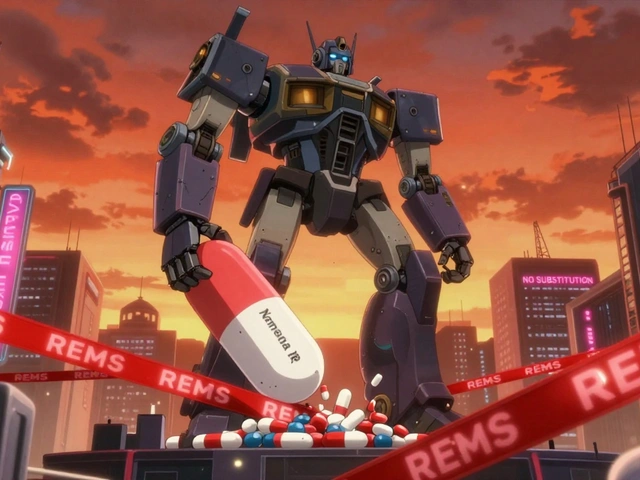
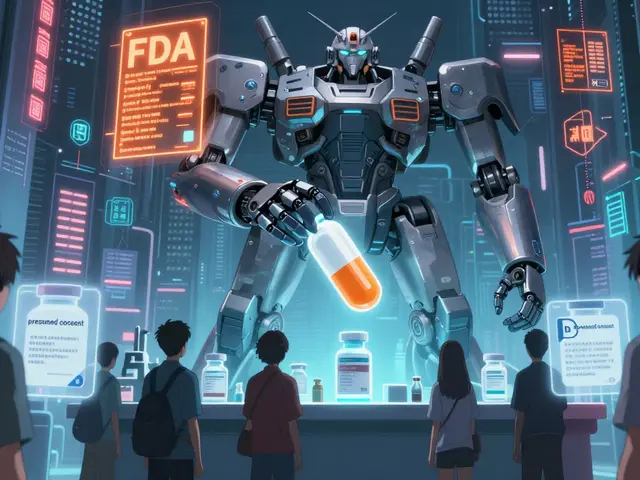

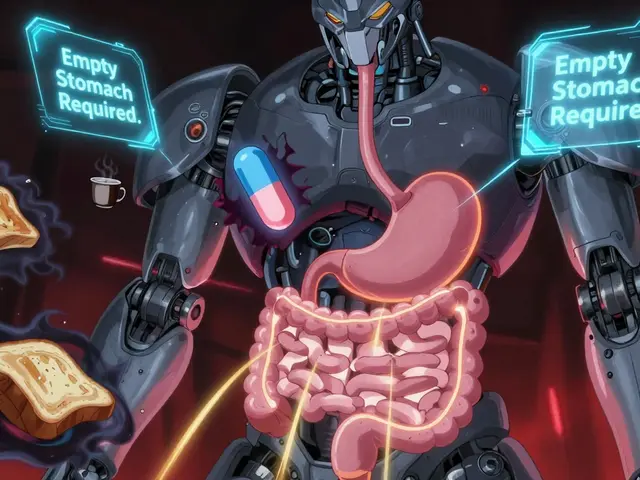
Andrew Forthmuller
November 14, 2025 AT 06:00This is why I always bring my whole medicine cabinet to the pharmacy now.
Nicole M
November 15, 2025 AT 00:33I used to think pharmacists were just there to hand out pills. Turns out they’re the unsung heroes of my health. I ask way more now.
Ryan Everhart
November 15, 2025 AT 23:33Wow. So the pharmacist is now your personal health coach, nutritionist, and therapist? Guess I’ll start paying them extra for emotional support.
Charles Lewis
November 16, 2025 AT 12:45It is imperative to recognize that the pharmacological landscape has become increasingly complex, and the patient’s role in medication safety has evolved from passive recipient to active participant. The questions enumerated here represent not merely procedural inquiries but foundational elements of informed consent and therapeutic adherence. Without this level of engagement, polypharmacy risks escalate exponentially, and iatrogenic harm becomes statistically inevitable. One must approach each prescription with the rigor of a clinical audit.
Samantha Wade
November 18, 2025 AT 10:35Every single point here is non-negotiable. If you don’t ask about interactions, storage, or dosage timing, you’re not just being careless-you’re endangering your life. I’ve seen people die because they didn’t ask if their grapefruit juice interfered with their statin. It’s not ‘being difficult.’ It’s being alive. Write this down. Print it. Tape it to your bathroom mirror. Your future self will thank you.
Elizabeth Buján
November 19, 2025 AT 14:19you know what’s wild? i used to take my meds like they were candy-no questions, no second thoughts. then one day i got dizzy and thought i was dying. turned out my blood pressure dropped because i took my pill with grapefruit juice. i didn’t even know that was a thing. now i ask EVERYTHING. even if it feels dumb. even if the pharmacist sighs. because my life isn’t a gamble. and neither is yours. you got this.
manish kumar
November 19, 2025 AT 17:38As someone who manages medications for elderly parents in India, I can tell you this article is a lifeline. Many here believe doctors know everything and pharmacists are just dispensers. But the truth? The pharmacist sees more drug interactions than the doctor ever does. I now carry a laminated list of all meds-dosage, time, reason-and I make sure the pharmacist checks it twice. This isn’t just advice; it’s a survival toolkit. Thank you for writing this.
Benjamin Stöffler
November 21, 2025 AT 17:03...and yet, the system remains fundamentally broken. We’ve turned healthcare into a transactional exchange, where the patient is expected to be a self-advocate, while the provider is incentivized to move the queue along. The fact that you must beg for clarity on your own medication is not empowerment-it’s a failure of institutional responsibility. The pharmacist should already know your full regimen. They should already have flagged interactions. They should already have explained the purpose in plain language. The burden should not be on you to ask. But since it is... ask. Always.
Mark Rutkowski
November 22, 2025 AT 19:31There’s a quiet revolution happening at pharmacy counters-not in labs or hospitals, but in conversations. It’s the moment someone dares to say, ‘I don’t understand.’ That single sentence cracks open the door to dignity. Medication isn’t magic. It’s chemistry. And chemistry doesn’t care about your silence. It only responds to clarity. So speak up. Even if your voice shakes. Even if you feel silly. The pills don’t care how confident you sound-they only care that you know what you’re taking. And that? That’s power.
David Barry
November 23, 2025 AT 11:55Let’s be real-90% of these questions are unnecessary if your doctor actually did their job. But since they don’t, we’re stuck playing detective with our own meds. I get it. But don’t act like this is some noble act of patient empowerment. It’s a workaround for a broken system. Also, ‘teach-back’? Cute. Sounds like something a corporate consultant dreamed up to make nurses feel better about being overworked.
Alex Ramos
November 23, 2025 AT 13:18I’m a pharmacist. I work 12-hour shifts. I see 80+ patients a day. And I LOVE when people ask questions. Seriously. It means you’re paying attention. It means I don’t have to guess. I’ve saved lives because someone asked about their turmeric supplement. I’ve stopped errors because someone noticed their pill looked different. Don’t be afraid to ask. I’m not annoyed-I’m grateful. And if I seem rushed? I’m sorry. Ask for another pharmacist. We’ve got your back.
vanessa k
November 23, 2025 AT 15:43I used to think asking questions made me look stupid. Then my mom had a reaction to a dye in her pill and ended up in the ER. Now I ask everything. Even if I’ve been taking the same med for 10 years. Because bodies change. And so do drugs. And I’m not risking another scare.
Arpita Shukla
November 24, 2025 AT 15:42Actually, most of these questions are redundant if you just read the FDA-approved patient leaflet. But people don’t read. They just grab the bottle and walk out. The pharmacist isn’t there to babysit your lack of attention. If you’re too lazy to read the paper that comes with your pill, don’t blame the system.
Renee Ruth
November 26, 2025 AT 12:22Oh great. Another feel-good listicle telling us to ask more questions. Meanwhile, my insurance denied my refill because ‘it’s not medically necessary.’ I’m supposed to spend 45 minutes at the pharmacy asking questions while the system actively works against me? No. I’ll just take the risk. At least I won’t waste my time.
Alyssa Lopez
November 27, 2025 AT 11:57Why are we even doing this? In America we have the best doctors and the best meds. If you can’t follow basic instructions, maybe you shouldn’t be taking pills at all. This is why our healthcare costs are so high-because people act like they’re in a courtroom instead of a pharmacy. Just take the damn pill.